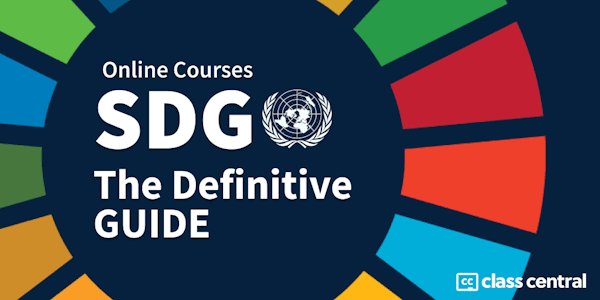The Sustainable Development Goals – A global, transdisciplinary vision for the future
University of Copenhagen via Coursera
-
1.4k
-
- Write review
Overview
In 2015, the UN launched the 17 Sustainable Development Goals (SDGs). Adopted by 193 member states, the goals represent an important international step in setting humanity on a trajectory towards sustainable development. Within this course, you will get a historical overview of how sustainability has been understood, as well as a thorough introduction to the SDGs – what they are, how progress can be measured, and how the SDGs are relevant for the management of the global systems supporting humanity. The course will examine how various societal actors are responding to and implementing the SDGs.
While all of the SDGs are essential to sustainable development, SDG 13, Climate Action, is usually perceived as the most urgent in terms of the need for a swift implementation on a global scale. Therefore, particular focus is given to this SDG. Through the course, you will gain up-to-date knowledge of the current understanding of human impacts on the Earth at the planetary level. Progress towards establishing global management of human interactions with the climate system within the United Nations Framework Convention on Climate Change (UNFCCC) is also discussed.
The course is designed and taught by Professor Katherine Richardson, who is a member of the 15-person panel appointed by the UN General Secretary in 2016 to write the 2019 Global Sustainable Development Report. In each lecture, Katherine interviews experts who provide insights relevant to the topic at hand.
Syllabus
- Sustainable Development as a Global Goal
- In this first module, you will be introduced to the concept of sustainability, its roots, and history of development. The framework of the SDGs is outlined in more detail, and we will discuss what sets them apart from previous international agreements, how we can measure progress and how the goals are interconnected. We will touch upon food systems, as an example of how the SDGs are relevant for - and can be implemented in - global systems through international cooperation.
- Managing human impacts on the natural world
- In this second module, we will have a more detailed look at the scientific evidence that human activities are influencing the Earth at the planetary level. You will be introduced to the concepts of Anthropocene and Planetary Boundaries. The biosphere (all living organisms or "biodiversity") is arguably just as - or more - important than climate for establishing the environmental conditions we enjoy on Earth, but receives much less attention. This module, therefore, will focus on monitoring and managing human impacts on climate and biodiversity as well as the potential consequences of failing to meet the goals of the SDGs relating to climate and biodiversity.
- Social sustainability and the way forward
- Where the last module focused on the impact of humanity's activities on the bio-physical components of the Earth system, this final section first focuses on the condition of humans, themselves, and the SDGs focusing on the improvement of that condition. You will be introduced to the concept of Doughnut Economics, which builds on the Planetary Boundaries framework. Finally, this module examines current status for implementation and provides examples of how different actors are engaging in global efforts to achieve the goals.
Taught by
Katherine Richardson
Tags
Reviews
5.0 rating, based on 2 Class Central reviews
4.8 rating at Coursera based on 4572 ratings
Showing Class Central Sort
-
This course presents an intimate, behind-the-scenes perspective on the Sustainable Development Goals, its ambitions and its issues & limitations. Professor Richardson, one of the people at the helm of the day-to-day efforts in framing and negotiating the contents of this strategy, has done a great job in relaying her experience and expertise in making the Goals "accessible" to the everyday person.
-
A very comprehensive and well-presented course! I have learned both about theory, international cooperation, and insights from interviews with experts or professors.





